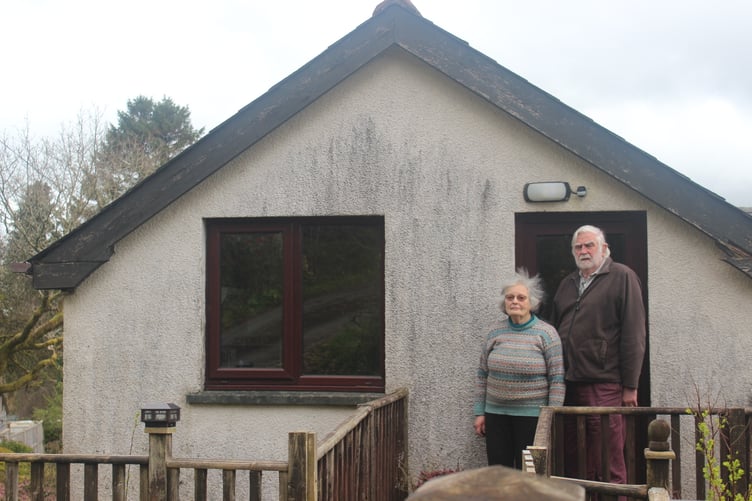A HOMEOWNER who said he was shocked to find out the “granny flat” in his cottage was considered a second home plans to dismantle part of its kitchen in a bid to avoid a second council tax bill.
Tony Jukes said he hoped that removing all evidence of cooking facilities, including the cooker switch, would exempt the granny flat from council tax, which he also pays for his cottage in Carmarthenshire. The granny flat, as of April 1 this year, also has a 50 per cent second home council tax premium added.
“What a ridiculous state of affairs,” said Mr Jukes, whose granny flat had previously been subject to business rates and rented out.
He said he asked for the unit to be removed from business rates last April when new regulations came into force in Wales which tightened eligibility criteria for self-catering accommodation. He said his request was also due to a health condition his wife, Margaret, has.
But Mr Jukes hadn’t expected the granny flat to then be liable for council tax as he considered it part of his extended cottage, which is in the grounds of the Golden Grove Estate, Gelli Aur, near Llandeilo, rather than separate from it.
The 77-year-old said the granny flat was finally removed from business rates at the end of February this year. A couple of days later he said he received a Band A council tax bill for it for £1,223.74p, covering 2023-24.
And five days after that he said he received a bill for £1,968.57p for 2024-25, which included a new 50% council tax premium on second homes in Carmarthenshire. “I was totally shocked,” he said.
These bills were on top of the Band D council tax he pays for the cottage – which is £1,968.58 this year – and more than he ever used to pay in business rates. He said he didn’t get additional council services in return.
Mr Jukes explained he had planning consent to include the granny flat when he extended his cottage just over 20 years ago. He said it was the upper storey of an extension and consisted of a kitchen, bathroom and living room-bedroom, with its own entrance from an outside walkway. He said his father-in-law had been too ill to move to Wales, so he registered the granny flat for business rates and began renting it out as a holiday let in 2005. He stopped doing this during the Covid pandemic and has not resumed since.
Self-catering providers in Wales have had to prove since April last year that they rent the accommodation out for 182 days a year to qualify for business rates – previously it was 70 days a year. Self-catering accommodation that isn’t eligible for business rates is generally listed as domestic and therefore liable for council tax – even accommodation within a primary home – which has surprised Mr Jukes.
“A granny flat is decreed to be a second home, and even if this flat is embedded in the main residence it is taxed separately although it has no open market value as it cannot be sold separately,” he said.
Mr Jukes, who served in the RAF for 30 years, said he would pay the 2023-24 Band A bill for the granny flat. But he hoped, following discussions with the council, to avoid the higher bill for 2024-25 by removing the cooking facilities – effectively turning the kitchen into a utility room. He said: “The chap I’ve spoken to at the council has been very understanding and helpful.” He added that his builder was booked in to do the work.
The tightening of business rates eligibility for self-catering accommodation was, said Finance Minister Rebecca Evans at the time, to ensure property owners “make a fair contribution” to the areas where they had homes or ran a business. At the same time this came into effect, councils in Wales were able to increase council tax premiums on second homes from a maximum of 100% to 300%.
Asked about Mr Jukes’s granny flat, a Welsh Government spokeswoman said a property which had its own separate valuation determined by the Valuation Office Agency – the agency responsible for council tax banding – was subject to a council tax charge and could be considered a second property.
Carmarthenshire Council said its taxation team has had two lengthy phone calls with Mr Jukes. Chris Moore, the council’s corporate services director, said: “The dwelling at Mr Jukes’s property had previously been used as a holiday let for some 18 years. As it no longer attained the necessary criteria for holiday let status, namely achieving 182 days of let, it was brought back into the council tax list from April 1, 2023. We were notified of this change through an update from the Valuation Office, received on February 28, 2024.
“Mr Jukes has outlined his proposal for the ‘annexe’ to the council. His intention was to remove the cooking facilities from the kitchen part of the annexe and utilise that part of the property as a utility room. The annexe is reached from within the main house via a flight of two stairs. The sleeping area and bathroom are doors off the corridor at the top of the stairs. It is only the kitchen/living area that is accessed via a closed door. We have asked Mr Jukes to carry out the proposed layout changes and provide photographic evidence and a copy of the revised floor plan. We will then report this to the Valuation Office, for them to consider a merger of the annexe with the main property.”
Mr Jukes disputed his granny flat was an annexe, and felt the new taxation system targeted people with two kitchens and could catch out farmers who had diversified into self-catering accommodation. “If you have two kitchens, then you have two living units and are ‘fair game’,” he said.
He said his view was that owners of second homes who ran them as a business should contribute more to the public purse, but he didn’t think that people whose second homes were used mainly by extended family should.




.png?width=209&height=140&crop=209:145,smart&quality=75)
Comments
This article has no comments yet. Be the first to leave a comment.